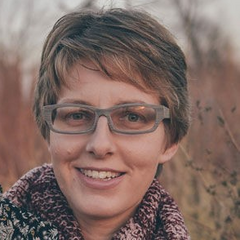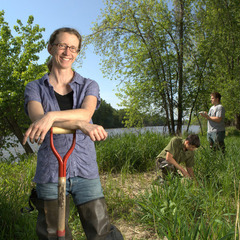PresentersNobel Conference Sneak Peek Soil Tour
 Kelsey Anderson
Kelsey Anderson
Kelsey was born and raised on her family’s hybrid seed corn and soybean seed farm just outside of St. Peter, Minnesota, and that is where her love and passion for agriculture were planted. Being active in 4-H and FFA cultivated her love of agriculture and eventually blossomed into a college degree from South Central College in North Mankato with a major in Agribusiness and an emphasis in service and management. Today, Kelsey is employed by the family business where she manages the office and handles the retail and wholesale sales. She works with many farmers from all over Southern Minnesota, which offers her the opportunity to learn about many different soil types and how she can offer products to fit the productivity of the array of soil types as well as the soil management practices of her customers.
 Susie Carlin
Susie Carlin
Susie Carlin is employed by Great River Greening as the Seven Mile Creek Watershed Coordinator. In that role, she advises farmers, park managers, and residential landowners on the best practices for maintaining soil and water health. A former fish biologist who has worked in the Gulf of Mexico’s Dead Zone, she is acutely aware of the connection between soil health, water quality, and our global oceans. Her path has taken her from Florida to southern Minnesota, where she has tackled the steep learning curve of understanding corn and soybean farming. In addition to working on behalf of the watershed, she also frequents the Seven Mile Creek County Park with her children and dog, and thinks it’s one of the best places in Minnesota to see the connection between agriculture, recreation, and environmental quality.
 Laura Day Triplett
Laura Day Triplett
Laura's been fired up about dirt her whole life. An early interest in sustainable agriculture techniques led her to the field of geology, where she was thrilled to discover she could study soil, water and rocks for a living. Her recent mission is to uncover how microscopic-scale chemical and biologic reactions in soil can add up to big changes in the water quality of our lakes, rivers and oceans. In her research, she strives to answer big questions -- How can we clean up our rivers? Why are our oceans changing? -- by studying the smallest chemical and biological processes in soils. Recently, Laura and her students have been working with area farmers to try to pinpoint which land management practices will have the best shot of maintaining agricultural productivity while also reducing water pollution.
Jim Dontje
James' first memory of thinking about soil was from watching a plow turn over soil on the northern Iowa farm where he lived, and seeing that snail shells were still in the soil many years after pothole wetlands were drained. Early in his career, he spent three years learning about soil and water conservation with farmers in Burkina Faso, west Africa. That experience confirmed his decision to study soil and water processes in graduate school and led to a broader focus on the sustainability of our interconnected energy and agricultural systems. James has worked with students at Gustavus to develop two efforts with a direct soils connection: the student garden, called Big Hill Farm, and the food waste composting program.
 Dennis Schmidt
Dennis Schmidt
Denny works for Upper Midwest Management, a farm management company that interacts with farmers and the soil they farm on a regular basis. He sees agriculture over a wide geographic area from Northern Iowa and across southern to central Minnesota and even up into the Red River Valley. Most of the farms that he manages are farmed conventionally and farmers are constantly gathering information from various sources to adapt to new technology. Besides working for Upper Midwest Management, Denny also farms part time on Nicollet County farm and raises corn and soybeans. He strives to be a good steward of our soil while working to show profitability in farming operations.